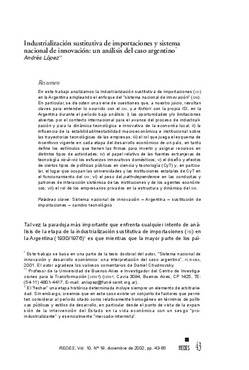Industrialización sustitutiva de importaciones y sistema nacional de innovación : un análisis del caso argentino
Import substitution industrialization and national innovation systems : an analysis of the Argentine case
Abstract
En este trabajo analizamos la industrialización sustitutiva de importaciones (ISI) en la Argentina empleando el enfoque del “sistema nacional de innovación” (SNI). En particular, se discuten una serie de cuestiones que, a nuestro juicio, resultan claves para entender lo ocurrido con el SNI, y a fortiori con la propia ISI, en la Argentina durante el período bajo análisis: i) las oportunidades y/o limitaciones abiertas por el contexto internacional para el avance del proceso de industrialización y para la dinámica tecnológica e innovativa de la economía local; ii) la influencia de la estabilidad/inestabilidad macroeconómica e institucional sobre las trayectorias tecnológicas de las empresas; iii) el rol que juega el esquema de incentivos vigente en cada etapa del desarrollo económico de un país, en tanto define los estímulos que tienen las firmas para invertir y asignar recursos en distintos tipos de actividades; iv) el papel relativo de las fuentes extranjeras de tecnología vis-à-vis los esfuerzos innovativos domésticos; v) el diseño y efectos de ciertos tipos de políticas públicas en ciencia y tecnología (CyT) y, en particular, el lugar que ocupan las universidades y las instituciones estatales de CyT en el funcionamiento del SNI; vi) el peso del path-dependence en las conductas y patrones de interacción sistémica de las instituciones y de los agentes económicos; vii) el rol de los empresarios privados en la estructura y dinámica del SNI. In this article we analyze the import substitution industrialization process (ISI) in Argentina employing the “national innovation system” (NIS) approach. On this basis, we will focus on certain questions that are specially important in order to understand what occurred with the NIS, and a fortiori with the ISI itself, in Argentina during the period under analysis: i) the opportunities and/or limitations opened by the international scenario for the advance of the industrialization process and for the technological and innovative dynamics of the local economy; ii) the influence of the macroeconomic and institutional stability/instability on the technological paths of the private firms; iii) the relevance of the prevailing incentives framework in each country as it defines the stimuli that firms have to invest and allocate resources in different kinds of activities; iv) the relative role of foreign sources of technology vis-à-vis domestic innovative efforts; v) the design and effects of certain kinds of public policies in Science and Technology (S&T) and, specially, the role played by universities and S&T public institutions on the performance of the NIS; vi) the weight of path-dependence on the behavior and interactions of institutions and economic agents; vii) the role of private entrepreneurs in the structure and dynamics of the NIS.

